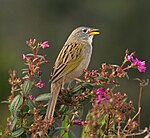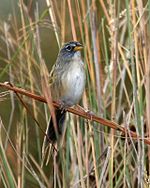Superregnum: Eukaryota
Regnum: Animalia
Subregnum: Eumetazoa
Cladus: Bilateria
Cladus: Nephrozoa
Superphylum: Deuterostomia
Phylum: Chordata
Cladus: Craniata
Subphylum: Vertebrata
Infraphylum: Gnathostomata
Superclassis: Tetrapoda
Cladus: Reptiliomorpha
Cladus: Amniota
Classis: Reptilia
Cladus: Eureptilia
Cladus: Romeriida
Subclassis: Diapsida
Cladus: Sauria
Infraclassis: Archosauromorpha
Cladus: Crurotarsi
Divisio: Archosauria
Subsectio: Ornithodira
Subtaxon: Dinosauromorpha
Cladus: Dinosauria
Ordo: Saurischia
Cladus: Theropoda
Cladus: Neotheropoda
Infraclassis: Aves
Ordo: Passeriformes
Subordo: Passeri
Infraordo: Passerida
Superfamilia: Passeroidea
Familia: Thraupidae
Genus: Emberizoides
Species: E. duidae – E. herbicola – E. ypiranganus
Name
Emberizoides Temminck, 1822
Typus: Sylvia herbicola Vieillot, 1817 = Emberizoides herbicola
References
Temminck, C.J. & Meiffren Laugier de Chartrouse 1821–1838. Nouveau recueil de planches coloriées d’oiseaux, pour servir de suite et de complément aux planches enluminées de Buffon, édition in-folio et in-4° de l’Imprimerie nationale, 1770. Levrault, Paris. Vol. III. No. 241–361. BHL Reference page. livr.19 textpl.114 BHL
Vernacular names
English: Grass finches
español: Coludos
suomi: Pyrstösirkut
Emberizoides is a small genus of finch-like tanagers found in grassy areas in Central and South America.
Taxonomy and species list
The genus Emberizoides was introduced in 1822 by the Dutch zoologist Coenraad Jacob Temminck.[1] The type species was later designated as the wedge-tailed grass finch by George Robert Gray.[2][3] The genus name combines the bunting genus Emberiza introduced by Carl Linnaeus in 1758 with the Ancient Greek -oidēs meaning "resembling".[4] This genus was traditionally placed with the buntings and New World sparrows in the subfamily Emberizinae within an expanded family Emberizidae.[3] A molecular phylogenetic study published in 2014 found that Emberizoides was embedded in the tanager family Thraupidae. Within this family, the genus is now placed with Embernagra and Coryphaspiza in the subfamily Emberizoidinae.[5][6]
The genus contains three species:[6]
| Image | Common Name | Scientific name | Distribution |
|---|---|---|---|
 |
Wedge-tailed grass finch | Emberizoides herbicola | Argentina, Bolivia, Brazil, Colombia, Costa Rica, Ecuador, French Guiana, Guyana, Panama, Paraguay, Peru, Suriname, Uruguay, and Venezuela |
| Duida grass finch | Emberizoides duidae | Venezuela | |
 |
Lesser grass finch | Emberizoides ypiranganus | Argentina, Brazil, Paraguay, and Uruguay |
References
Temminck, Coenraad Jacob (1838). Nouveau recueil de planches coloriées d'oiseaux, pour servir de suite et de complément aux planches enluminées de Buffon (in French). Volume 3. Paris: F.G. Levrault. Plate 114 with text (Livraison 19). The title page is dated 1838 but the 5 volumes were originally issued in 102 livraison (parts) between 1820 and 1839. For a discussion of the dates see: Dickinson, E.C. (2001). "Systematic notes on Asian birds. 9. The Nouveau recueil de planches coloriées of Temminck & Laugier (1820–1839)". Zoologische Verhandelingen, Leiden. 335: 7–53.
Gray, George Robert (1840). A List of the Genera of Birds : with an Indication of the Typical Species of Each Genus. London: R. and J.E. Taylor. p. 43.
Paynter, Raymond A. Jr, ed. (1970). Check-List of Birds of the World. Volume 13. Cambridge, Massachusetts: Museum of Comparative Zoology. p. 129.
Jobling, James A. (2010). The Helm Dictionary of Scientific Bird Names. London: Christopher Helm. p. 145. ISBN 978-1-4081-2501-4.
Burns, K.J.; Shultz, A.J.; Title, P.O.; Mason, N.A.; Barker, F.K.; Klicka, J.; Lanyon, S.M.; Lovette, I.J. (2014). "Phylogenetics and diversification of tanagers (Passeriformes: Thraupidae), the largest radiation of Neotropical songbirds". Molecular Phylogenetics and Evolution. 75: 41–77. doi:10.1016/j.ympev.2014.02.006.
Gill, Frank; Donsker, David; Rasmussen, Pamela, eds. (July 2020). "Tanagers and allies". IOC World Bird List Version 10.2. International Ornithologists' Union. Retrieved 20 November 2020.
Retrieved from "http://en.wikipedia.org/"
All text is available under the terms of the GNU Free Documentation License

